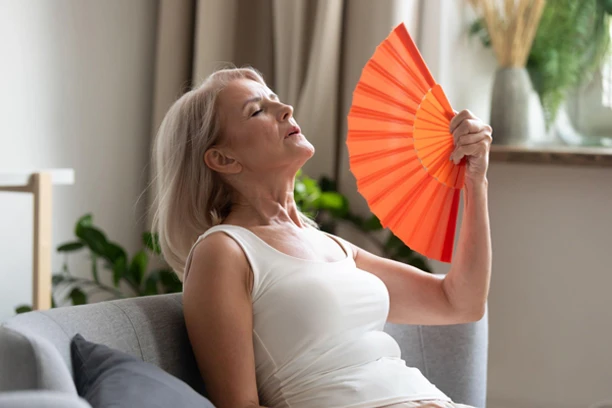Menopause happens when a woman has not menstruated for 12 months and is no longer able to become pregnant naturally. Although it might appear earlier or later than this window of time, it frequently begins between the ages of 45 and 55.
Menopause discomforts include hot flashes and weight gain. For the majority of women, menopause doesn’t require medical intervention. Minor to moderate menopause symptoms can be reduced naturally in a number of ways, including through lifestyle adjustments, home remedies, and complementary therapies.
Here are some home remedies and lifestyle changes for menopause management:
Keeping cool and staying comfortable
Particularly at night and during warm or unpredictable weather, wear loose, layered clothing. By doing this, heat flashes can be controlled.
You can lessen your likelihood of experiencing night sweats by keeping your bedroom cold and staying away from thick blankets at night. If you frequently get night sweats, think about protecting your mattress by laying a waterproof sheet beneath your comforter.
If you are feeling overheated, you can also bring a small fan with you to help you cool off.
Exercising and managing your weight
To assist you to maintain your weight, cut your daily calorie consumption by 400 to 600. A moderate amount of physical activity for 20 to 30 minutes every day is also essential. This can help:
- Increase energy
- Promote a better night’s sleep
- Improve mood
- Promote your general well-being
Communicating your needs
With a therapist or psychologist, you can discuss any negative emotions including depression, worry, grief, loneliness, insomnia, or identity changes.
In order for them to understand your requirements, you should also try discussing your emotions of worry, mood fluctuations, or sadness with your family, loved ones, or friends.
Supplementing your diet
Magnesium, calcium, and vitamin D supplements can help you sleep better and have more energy while lowering your chance of developing osteoporosis. Consult your doctor about any supplements that can be beneficial for your particular health requirements.
Practising relaxation techniques
Use breathing exercises and relaxation techniques, such as:
- Yoga
- Box breathing
- Meditation
Taking care of your skin
To lessen skin dryness, apply moisturisers every day. Excessive bathing or swimming should also be avoided because they can dry out or irritate your skin.
Managing sleep issues
To temporarily alleviate your insomnia, try over-the-counter sleeping drugs, or discuss using natural sleep aids with your doctor. If you frequently struggle with sleep, discuss it with your doctor so they can advise you on how to handle it and obtain a better night’s sleep.
Quit smoking and limit alcohol use
Avoid second-hand smoke by quitting smoking. Your symptoms could get worse if you are exposed to cigarettes.
Alcohol use should be restricted as well to prevent symptoms from getting worse. If you drink excessively during menopause, your risk of having health problems may rise.
Other remedies
The use of herbal treatments for menopausal symptoms brought on by an oestrogen deficit has been validated by a few small studies.
Natural vitamins and nutrients that could lessen the effects of menopause include:
- Soy
- Vitamin E
- Isoflavone
- Melatonin
- Flax seed
Black cohosh is also said to help with some symptoms, including hot flashes and nocturnal sweats. However, a recent analysis of studies revealed that there was little proof to back up these assertions. More study is required.
Outlook
Menopause, which signifies the end of fertility, is the natural termination or end of a woman’s menstrual cycle. Menopause typically occurs in women at the age of 52, however, it can occur suddenly earlier in life due to pelvic or ovarian injury. The early onset of menopause may also be caused by genetics or underlying diseases.
Many women experience menopause symptoms in the few years before the transition, the most common of which are hot flashes, nocturnal sweats, and flushing. After menopause, symptoms can last for four or more years.
If your symptoms are severe or have a negative impact on your quality of life, you may benefit from medication such as hormone therapy. We hope that these home remedies and lifestyle changes for menopause can help you to control your menopause symptoms.


One Comment
Pingback: Home Remedies And Lifestyle Changes For Menopause – Sujata Birla Hospital